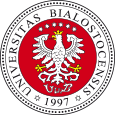Szanowni Państwo,
pierwsze w roku 2021 Konwersatorium im. Jerzego Pniewskiego i Leopolda Infelda Wydziału Fizyki UW odbędzie się w poniedziałek, 25 STYCZNIA, o godz. 16.30.
Tym razem będziemy mieli przyjemność wysłuchania wykładu PROF. TOMASZA LIPNIACKIEGO z Instytutu Podstawowych Problemów Techniki Polskiej Akademii Nauk pt.
„SARS COV 2 SUPER-SPREADERS AND SUPER-SPREADING VARIANT OF CONCERN 202012/01”
Wraz z czasem mijającym od początku pandemii SARS CoV 2 przybywa danych empirycznych i poprawia się nasze rozumienie mechanizmów odpowiedzialnych za rozprzestrzenianie się wirusa. Ma to wyraz także w konstrukcji coraz bardziej wiarygodnych modeli opisujących np. dystrybucję zachorowań w czasie. Nadchodzący wykład pozwoli nam na zapoznanie się z najbardziej aktualnym stanem wiedzy w tym zakresie.
Streszczenie wykładu znajduje się poniżej tej wiadomości.
Link do Konwersatorium na platformie Zoom to:
https://us02web.zoom.us/j/93881687598?pwd=UmFhVUdVSXhnQ2tIVVozNmowSUNtZz09.
Numer identyfikacyjny spotkania: 938 8168 7598
Kod dostępu: prv316
Zapraszamy do dołączenia do spotkania 15-30 minut przed rozpoczęciem wykładu, by porozmawiać lub „poczatować” w nieformalnej atmosferze.
Pozdrawiamy,
Barbara Badełek
Jan Chwedeńczuk
Jan Kalinowski
Jan Suffczyński
—-
Dear Colleagues,
the first in 2021 year, Jerzy Pniewski and Leopold Infeld Colloquium of the Faculty of Physics will be held on MONDAY, JANUARY THE 25TH, at 4.30 PM.
This time we will listen to a lecture of PROF. TOMASZ LIPNIACKI from Institute of Fundamental Technological Research, Warsaw, Poland. The lecture title is:
„SARS COV 2 SUPER-SPREADERS AND SUPER-SPREADING VARIANT OF CONCERN 202012/01”
With the time passing since the beginning of the SARS CoV 2 pandemic, empirical data are increasing and our understanding of the mechanisms responsible for the spread of the virus is improving. This is also reflected in the construction of increasingly reliable models describing, for example, the distribution of incidence over time. The upcoming lecture will give us an overview of the most current state of knowledge in this area.
The abstract of the lecture is provided below this message.
Here is a link to the Colloquium on the Zoom platform:
https://us02web.zoom.us/j/93881687598?pwd=UmFhVUdVSXhnQ2tIVVozNmowSUNtZz09
Meeting ID: 938 8168 7598
Passcode: prv316
You are welcome to join the meeting 15-30 minutes before the Colloquium to talk or chat in informal atmosphere.
With best regards,
Barbara Badełek
Jan Chwedeńczuk
Jan Kalinowski
Jan Suffczyński
———————————————————————-
„SARS CoV 2 super-spreaders and super-spreading Variant of Concern 202012/01”
prof. Tomasz Lipniacki, (Institute of Fundamental Technological Research, Warsaw, Poland)
The basic reproduction number R0 of the coronavirus disease 2019 has been estimated to range between 2 and 4. We used an SEIR model that properly accounts for the distribution of the latent period and, based on empirical estimates of the doubling time in the near-exponential phases of epidemic progression in China, Italy, Spain, France, UK, Germany, Switzerland and New York State, we estimated that R0 lies in the range 4.7-11.4. We explained this discrepancy by performing stochastic simulations of model dynamics in a population with a small proportion of super-spreaders.
The novel SARS-CoV-2 Variant of Concern (VOC)-202012/01 (also known as B.1.1.7), first collected on September 20, 2020, in Kent, UK, is a rapidly growing lineage. Based on GISAID we estimated that the replicative advantage of the VOC-202012/01 lineage is in the range of 1.85-2.17 with respect to the 20A.EU1 variant (dominating in England in November 2020) and in the range of 1.99-2.36 with respect to other non-VOC-202012/01 strains. Such significant replicative advantage and the fact that London serves as major international transportation hub suggest that the VOC-202012/01 strain will likely become globally dominant, hindering containment of the COVID-19 epidemics prior to mass vaccinations.
See also:
SARS-CoV-2 Variant Under Investigation 202012/01 has more than two fold replicative advantage, Frederic Grabowski, Grzegorz Preibisch, Marek Kochańczyk, Tomasz Lipniacki
https://doi.org/10.1101/2020.12.28.20248906
Super-spreading events initiated the exponential growth phase of COVID-19 with ℛ0 higher than initially estimated, Marek Kochańczyk, Frederic Grabowski and Tomasz Lipniacki
https://doi.org/10.1098/rsos.200786
